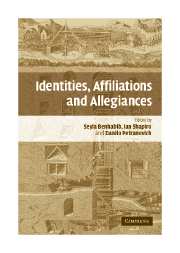Book contents
- Frontmatter
- Contents
- List of figures
- List of tables
- List of contributors
- Editors' introduction
- Part I Emergence and limits of national political identities
- Part II Multiple identities in practice: the European example
- Part III Decoupling citizenship from identity
- 8 Binding problems, boundary problems: the trouble with “democratic citizenship”
- 9 Immigrant political integration and ethnic civic communities in Amsterdam
- 10 Nonterritorial boundaries of citizenship
- 11 Against birthright privilege: redefining citizenship as property
- Part IV Identity and historical injustice
- References
- Index
9 - Immigrant political integration and ethnic civic communities in Amsterdam
Published online by Cambridge University Press: 05 June 2012
- Frontmatter
- Contents
- List of figures
- List of tables
- List of contributors
- Editors' introduction
- Part I Emergence and limits of national political identities
- Part II Multiple identities in practice: the European example
- Part III Decoupling citizenship from identity
- 8 Binding problems, boundary problems: the trouble with “democratic citizenship”
- 9 Immigrant political integration and ethnic civic communities in Amsterdam
- 10 Nonterritorial boundaries of citizenship
- 11 Against birthright privilege: redefining citizenship as property
- Part IV Identity and historical injustice
- References
- Index
Summary
Introduction
Since the events of “9/11,” the debate in most Western countries on multicultural democracy has intensified. Key terms in this debate are terrorism; violence; Islam; democratic values; and commitment to democratic institutions. In the Netherlands, the fall of the World Trade Center towers resulted in an extensive public debate on the political integration of immigrants. Can Islam be combined with democratic values such as freedom of speech and the equality of men and women? Are immigrants committed to democratic institutions and, if not, how can their commitment be improved? Do they identify with the host country or their country of origin? These questions show that the concept of political integration is a multidimensional one. At least four (not mutually exclusive) conceptions of political integration can be distinguished: political incorporation; political participation; political acculturation; and political assimilation. We have distinguished these four conceptions by identifying germane normative conceptions of political integration. In figure 9.1 we try to summarize these conceptions (for a more extensive discussion refer to Slijper 2002).
The first important normative distinction underlying the idea of political integration is that between (i) democracy and (ii) nationhood. Framed in terms of democracy, the central “problem” of political integration is the (in)equality of citizens. Accordingly, immigrant ethnic minorities are here primarily defined as aliens that need to become full citizens. Nationhood, on the other hand, frames the question of political integration mainly in terms of unity and identity.
- Type
- Chapter
- Information
- Identities, Affiliations, and Allegiances , pp. 206 - 225Publisher: Cambridge University PressPrint publication year: 2007
- 6
- Cited by



